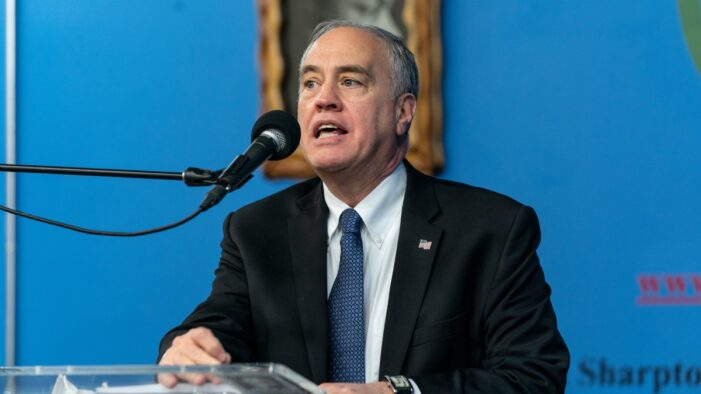New York, NY – January 18, 2021: Thomas DiNapoli, New York State Comptroller speaks during Martin Luther King celebration at NAN headquarters. (Shutterstock)
By Chris Tobias
The devastating number of job losses caused by the COVID-19 pandemic caused a significant increase in the number of residential customers owing money to their utility companies, with one in eight customers in arrears as of March 2022, according to a report released today by State Comptroller Thomas P. DiNapoli. More than 1.2 million customers statewide owed $1.8 billion with customers from New York City and Long Island comprising 60% of those in arrears and 68% of the amount owed.
In the first quarter of 2022, the number of customers behind on their bills fell by about 50,000 to 1.2 million while the total amount owed grew to $1.8 billion, an increase of close to $1 billion from March 2020. The average amount customers owed over this period doubled from $768 in March 2020 to $1,467 in March 2022.
“The pandemic’s effects continue to be felt in multiple aspects of life, including the elevated number of New Yorkers who continue to have trouble paying their utility bills,” DiNapoli said. “Failure to pay these bills may result in service shutoffs, which increases economic stress on families and can damage local economies by reducing household spending, leading to job losses. State lawmakers and the Public Service Commission have acted to provide meaningful relief to low-income customers through the Utility Arrears Relief Program and the Phase 1 Arrears Reduction Program and should continue to consider mechanisms to help utility customers that cannot pay their bills.”
DiNapoli’s report, includes:
- Arrears by state’s largest electric and gas utilities;
- Regional breakdown of residential customers and amount in arrears; and
- Allocation of state funds and authorized cost recovery.
Caribbean American Weekly spoke to Attorney Brian Figeroux of Ask the Lawyer Radio Program (www.askthelawyer.us) about the mounting debt in the Caribbean community and how we can get out of it. Attorney Figeroux has over two decades of practicing bankruptcy law. In addition to being a lawyer, he has an education and experience in economics, accounting, and banking.
Listen to Attorney Brian Figeroux speak on “Debt Collection” below:
Figeroux explained, “There’s a lot of debt that we have accumulated during the COVID-19 pandemic. After the pandemic, the stock market is now a bear market. Shares are going down, then going up, then down again. So, people are speculating based on what? Who makes a bad mistake? I’ll benefit from it. But most of us are not involved in the stock market unless we have a pension plan and professionals managing our monies or 401K plans, et cetera. Then there’s inflation. Inflation means prices are going up. Prices are going up because of demand and supply, and there’s not enough supply. Prices are going up because of the war in Ukraine. Prices are rising because the gas stations, Exxon, and other oil companies are increasing prices. They are not following demand and supply but are price gouging, meaning they are taking advantage of us. And nobody could save us, not even the President of the United States, President Biden. The only person who could save us is ourselves.”
Getting Out of Debt
Given everything, how do we get out of this rut? What happens when we accumulate debt? Answering those questions, Figeroux gave the following advice, “When do we deal with this issue? Should we file debt consolidation? Debt consolidation is where you put all your debt into one pool, and you pay a monthly a month. It never ends. And then you complain that, hey, the debt is not going down. It’s like a Chapter 13 bankruptcy where you consolidate it to your debt, and then you pay it back. In fact, The New York Times has an article that says that white lawyers tell black people and brown people to do a Chapter 13 bankruptcy rather than a Chapter 7. And as I just explained, Chapter 13 is like debt consolidation, and all of your guys are doing debt consolidations. And if you listen to some of the “best black radio stations,” they have a lot of advertisements that say consolidate debt. And the answer is no. Do not consolidate your debt. Please do not do a Chapter 13 bankruptcy. You only do it if you must. No attorney in their right mind who understands bankruptcy laws would recommend a Chapter 13 bankruptcy.”
Understanding Your Legal Options
Figeroux added, “They [lawyers] should tell you about the legal options, the benefits, and the disadvantages so that you can make the best decision. But they shouldn’t be making decisions for you because some of these lawyers give you advice so that they can charge the most legal fees, unfortunately, especially when they don’t look like you. And if you don’t understand that, then it means that you don’t understand black history. And you don’t even understand the concept of Juneteenth. We celebrate our “emancipation,” but we haven’t been emancipated yet.
How do you handle all this debt and the pain that comes with it? How do you plan your future? The Law Firm of Figeroux & Associates has the experience to handle these issues. Get the best advice to make the right decision for you and your family. Visit www.askthelawyer.us or call 855-768-8845. The lawyer you hire does make a difference!






